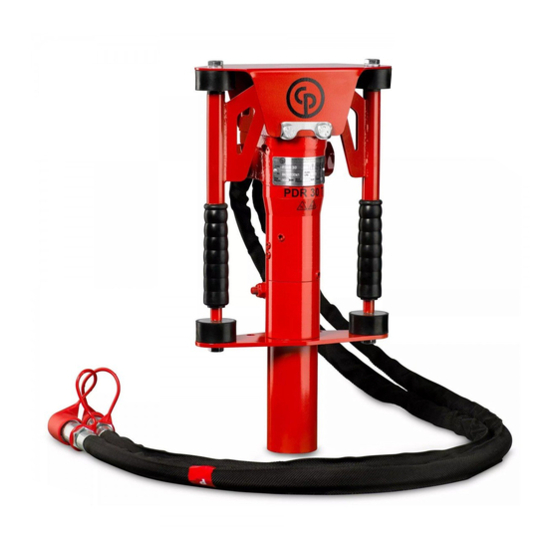Atlas Copco PDR 30 T Manuale di sicurezza e istruzioni per l'uso - Pagina 10
Sfoglia online o scarica il pdf Manuale di sicurezza e istruzioni per l'uso per Attrezzature per l'edilizia Atlas Copco PDR 30 T. Atlas Copco PDR 30 T 11.

PDR 30 T
♦
Before starting maintenance on the machine,
clean it in order to avoid exposure to hazardous
substances. See "Dust and fume hazards"
Use only authorised parts. Any damage or
♦
malfunction caused by the use of unauthorised
parts is not covered by warranty or product
liability.
When cleaning mechanical parts with solvent,
♦
comply with appropriate health and safety
regulations and ensure there is satisfactory
ventilation.
For major service of the machine, contact the
♦
nearest authorised workshop.
After each service, check that the machine's
♦
vibration level is normal. If not, contact the nearest
authorised workshop.
♦
Tighten the sockets (A) to the required torque, do
not over tighten. There are two sockets, one on
each side on the machine. See the spare parts list
for required torque.
Every day
Clean and inspect the machine and its functions
♦
each day before start working.
Conduct a general inspection for leaks, damage,
♦
and wear.
Change damaged parts immediately.
♦
♦
Replace worn components in good time.
Make sure that all the attached and related
♦
equipment, such as hoses and flow dividers are
properly maintained.
♦
Clean the quick-release couplings before use.
3392 5240 01 | Original instructions
A
Safety and operating instructions
Every month
♦
Check torque tightness of all fasteners.
Check the bush in the nose casting for wear or
♦
damage. Replace if necessary.
Check wear on the shank of the ramming tool.
♦
Spray suitable lubricant into the sliding bushings
♦
of the trigger-handle and anvil into the front body.
Periodic maintenance
After each operating period of approximately 600
impact hours or yearly the machine must be
dismantled and all parts be cleaned and checked.
This work must be performed by authorized staff,
trained for this task.
Storage
♦
Disconnect the machine s hoses from the power
source, see "Start and stop".
♦
Make sure that the machine is properly cleaned
before storage.
Always store the machine in a dry place.
♦
Disposal
A used machine must be treated and scrapped in
such a way that the greatest possible portion of the
material can be recycled and any negative influence
on the environment is kept as low as possible.
Before a used machine is scrapped it must be
emptied and cleaned from all hydraulic oil. The
remaining hydraulic oil must be deposited and any
negative influence on the environment is to be kept
as low as possible.
15
